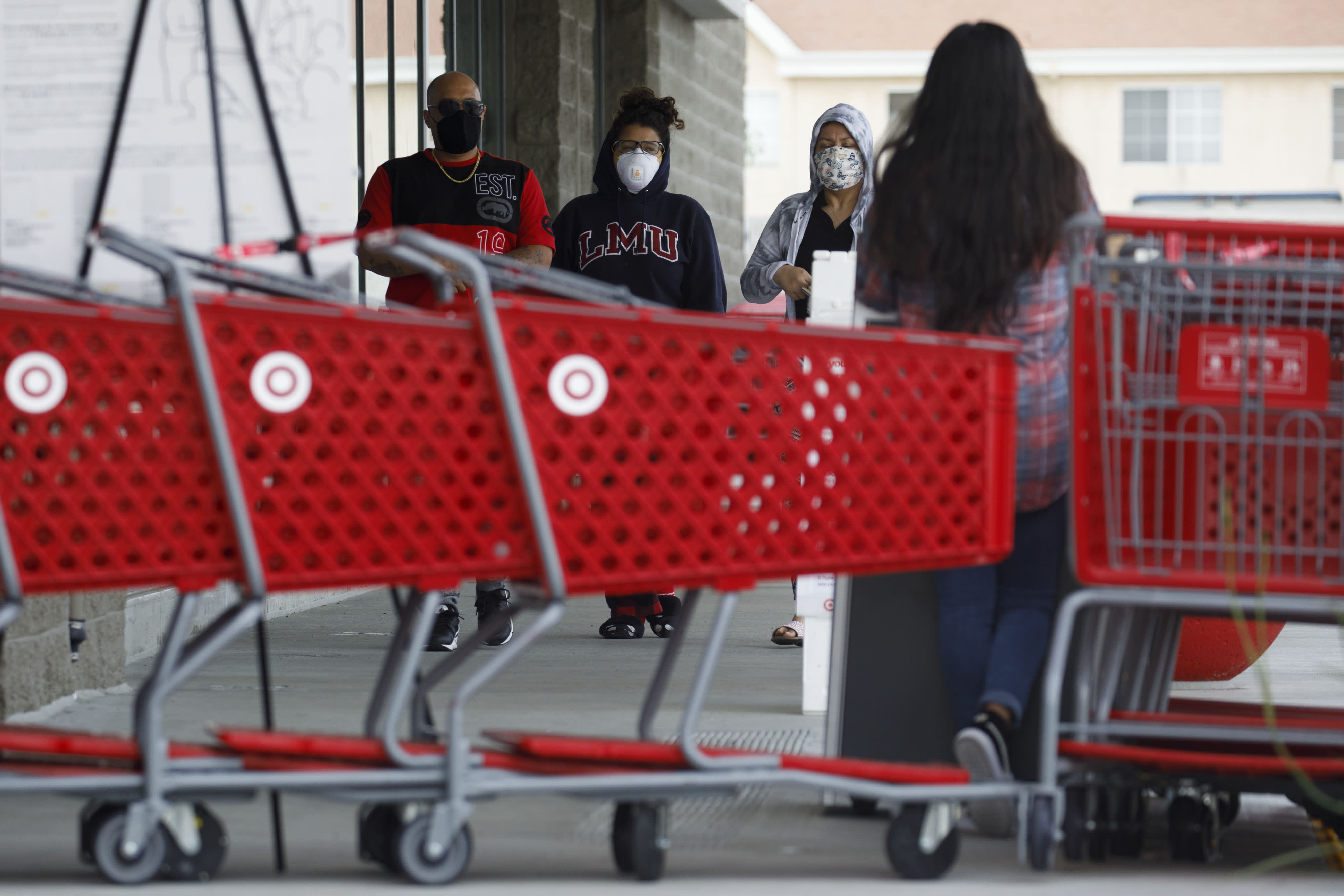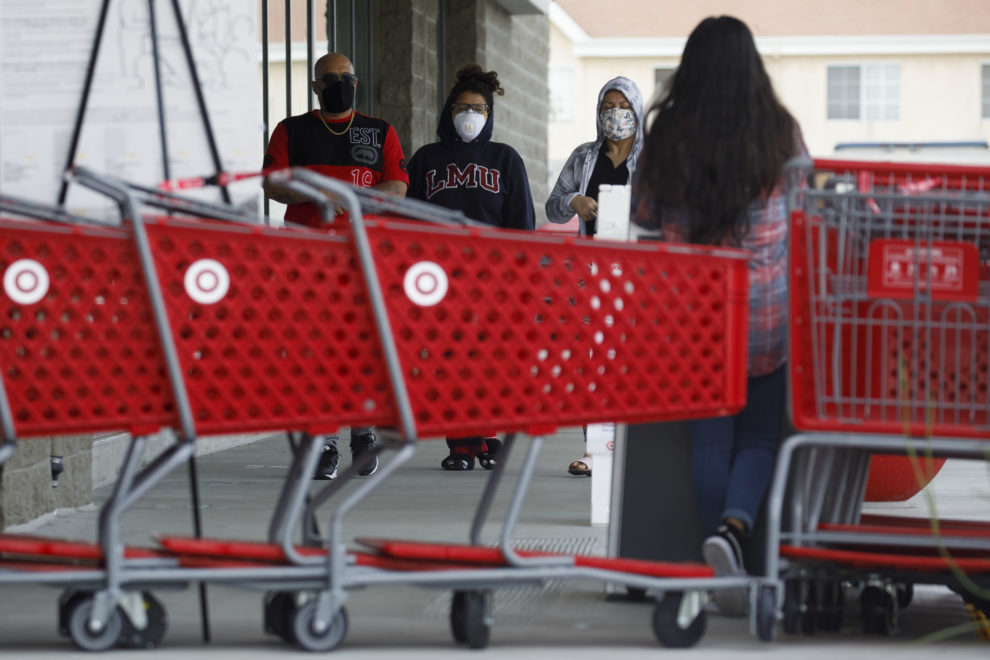
Target has seen a sharp increase in online sales, as shoppers try to limit time inside stores or avoid the trips altogether during the coronavirus pandemic, CEO Brian Cornell said Thursday.
That trend has worked in the discount retailer’s favor, and it expects to emerge from the coronavirus pandemic having gained market share, Cornell said.
Since its fiscal first quarter began Feb. 2, Target’s same-store sales have risen more than 7%, the retailer said. The gain, which compares with an increase of 1.5% in the fiscal fourth quarter, is the result of a doubling of its online sales, partially offset by declines inside its nearly 1,900 brick-and-mortar stores.
In an interview with CNBC’s “Squawk Box” on Thursday, Cornell said Target is trying to figure out if customers’ new shopping patterns are here to stay.
“We are spending a lot of time trying to understand how the pandemic is going to change the future of how American consumers shop, how they live, how they work, the things that they value,” he said. “But it’s been really hard to predict week by week.”
Cornell did not provide any specific estimates for its quarterly earnings. But said, higher labor costs, the sale of more low-margin items and writes down of inventory in apparel and accessories because of a drop in sales, will weigh on profits.
The stock was down about 6% in Thursday’s premarket.
Target is spending more on worker pay and benefits. The company said it’s already spent more than $300 million on coronavirus-related employee expenses, such as paid sick leave, quarantine pay, and access to mental health care.
Target announced Thursday plans to extend its $2 an hour temporary pay increase for store employees, additional child care or backup care benefits and paid leave policy for older or at-risk members of its workforce until May 30 — an acknowledgment that the retailer doesn’t expect business to return to usual for many more weeks or months.
Benefiting from investments
One factor that has helped Target is the investment it’s made to offer customers different ways to shop, including the ability to order online and either drive-up or walk inside to pick-up purchases. It also has Shipt, a same-day personal shopping service that delivers to the home.
In April, Target has had weeks when drive-up volume was up to seven times greater than normal, Cornell said. It’s had single days when the volume of order pickup was twice as high as Cyber Monday. And on the Friday before Easter, he said, it did more volume through Shipt than it typically does in a week.
So far in April, comparable digital sales have increased by more than 275% from a year ago.
Cornell told CNBC he expects some of customers’ new habits to stick, as they discover the ease of driving up and having Target employees put purchases in their trunk or having a shopper from Shipt drop bags of groceries at their home.
He said he also expects customers to continue consolidating their shopping into fewer trips, another trend that would benefit the big-box store.
“You can shop for your home,” he said. “You can get all of those office supplies, games for your kids, the electronics you need for your office — as well as household essentials and your medication, food and beverage. I certainly think that going forward, for the forseeable future, consumers are going to take advantage of that one-stop shop.”
Some categories performed better than others in the quarter thus far: Same-store sales grew more than 20% in its essentials and food and beverage categories and more than 16% in hardlines. They declined more than 20% in its apparel and accessories category and were up slightly in home.
Even as more customers shop online, Cornell said stores have played a pivotal role: The large footprint of stores across the U.S. allows customers to do same-day pickup and it allows workers to speed up fulfillment of online orders.
An evolving environment
Even as an essential retailer, Cornell said Target has had to adapt to fast-changing business dynamics.
In late March, Target withdrew its guidance for the first quarter and fiscal year, postponed all new store remodels and delayed openings of many small-format stores. It said it would hold off on some strategic priorities, too, such as plans to add fresh food and alcohol to curbside pickup.
Target has watched customers shop and behave differently as the world around them changes. Initially, he said customers stocked up on household essentials, food, and medications. As they heard they would shelter at home, he said Target saw a spike in supplies needed to work and attend school remotely and games to help them stay entertained. In recent weeks, he said, customers have listened to government and public health officials, and are starting to shop while wearing face masks.
Cornell said it is difficult to know how to communicate with customers and whether to do seasonal or holiday promotions. He said Target wants to make sure its advertising and customer messages fit with the times, but also “sprinkle in a little bit of joy.”
“We’re contemplating ‘What does Memorial Day look like in this environment?'” he said.
Target recognizes “there’s going to be several more months where there’s going to be significant concern as we work through this pandemic,” Cornell said, adding it is doing surveys, talking to medical experts, and working government officials to try to plan for the future.
But, he said, “unfortunately, I don’t have a crystal ball.”
In a research note last week, BMO Capital Markets upgraded Target’s stock to outperform. It said Target would emerge from the pandemic with a competitive advantage, as Macy’s, Gap, J.C. Penney, and other apparel and home retailers that had financial challenges before the coronavirus struggle even more to stay afloat.
Target shares, which are valued at $53.5 billion, are down nearly 17% so far this year, but the stock’s losses are far less than those posted by some of its rivals. Target’s stock closed Wednesday at $106.84. BMO Capital has set a price target of $125 for the stock.
Cornell said the economic fallout of the pandemic will exacerbate the divide between “winners and losers” in the retail industry. He said he’s been troubled to see the coronavirus outbreak prompt other retailers to furlough employees and expects the pandemic will push many of retailers onto shakier financial footing.
“The companies that have had the balance sheet, have had the ability to invest in their stores, in their digital capabilities, in their brand and importantly, in their teams, have certainly been gaining market share for several years now,” he said. “We’ve been part of that group that’s been gaining share and thriving in the environment.”
Cornell said he expects Target to pick up business in apparel, home, and other categories as some competitors struggle or permanently close their doors.
But, he added, “watching the industry decline is not something I enjoy.”











Add Comment